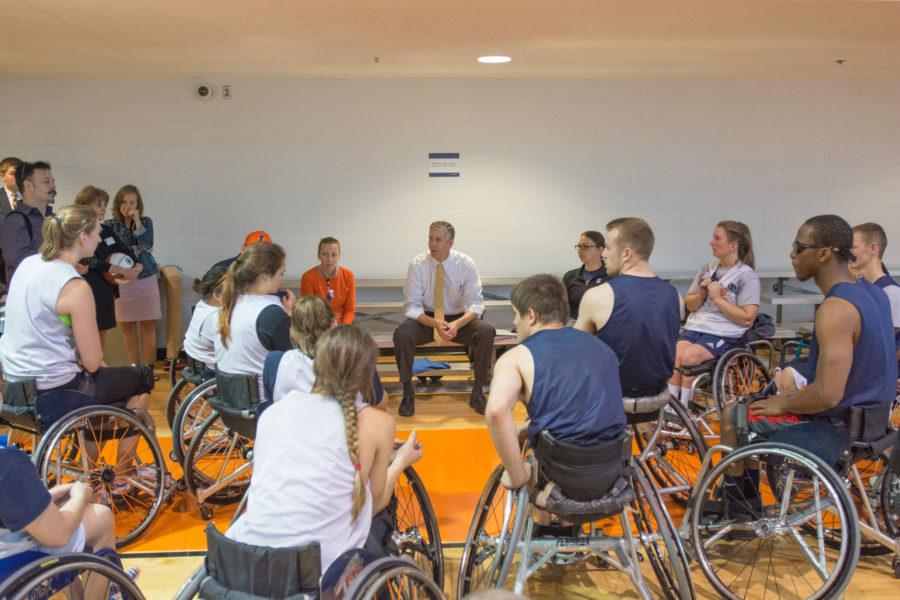Duncan visits UI, discusses challenges for students with disabilities
U.S. Secretary of Education Arne Duncan talks with members of the University’s wheelchair basketball team Wednesday morning at the ARC.
September 16, 2015
The Men’s and Women’s wheelchair basketball teams had a special spectator at their Wednesday morning practice. Arne Duncan, U.S. Secretary of Education, visited the ARC as part of his national “Back-To-School” bus tour.
“[UI’s wheelchair basketball program] is extraordinary, and I have read a lot about it before in Chicago,” Duncan said. “But to see the difference they’re making, and the opportunities they’re creating. Its unbelievable.”
Duncan’s sixth annual bus tour is themed “Ready for Success.” During his visit he highlighted the successes made in education and the accompanying challenges as well.
The University’s Disability Resources and Educational Services program was a big focus of Duncan’s visit. He heralded the University as a model for campus disability services and called on universities across the nation to implement similar programs.
Get The Daily Illini in your inbox!
“Again, the University of Illinois is an absolute model,” Duncan said. “It is an absolute model for the nation to be looking at.”
Following the basketball practice, Duncan participated in a roundtable discussion with students, alumni and faculty, including DRES Director Pat Malik and Michael Yudin, U.S. assistant secretary for special education and rehabilitative services .
Duncan listened as each member of the panel told their own story about their experience with disability resources on campus.
The panel told Duncan that while the University is doing a standout job in providing resources, the students believe there needs to be a stronger foundation of promoting and providing such resources nationwide.
“There needs to be some type of report almost, across the nation of what schools provide services and what [schools] don’t. So that people can do research and they don’t just have University of Illinois as the only option out there anymore,” said Brian Siemann, University alumnus and US Paralympic Track and Field National Team member.
James Applegate, executive director of the Illinois Board of Higher Education, said the U.S. needs to better appreciate what people with disabilities have to offer.
“We need all the talent we can get in this country,” he said. “To not take advantage of this talent, and learn all that we know from people with disabilities, is economically stupid. And morally wrong.”
Siemann highlighted the panel’s accomplishments, but stressed the need for continued progress.
“This is a great first-step in formulating some type of formal plan or idea of how schools can better provide access to disabled,” Siemann said. “There still needs to be more specific concrete things that are planned out but this is a really, really great first step.”
Duncan said the fact that universities provide such little information about disability resources is a challenge.
“We have a long way to go, this is an area we can do more,” he said. “Another big point of this bus tour is not only us to highlight, but for us to learn and listen and figure out how to help.”







